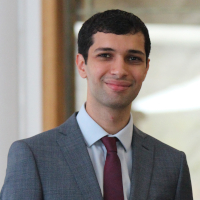
|

|

|
IUHPST Essay Prize in History and Philosophy of Science 2023
The Joint Commission of the International Union of History and Philosophy of Science and Technology (IUHPST) is pleased to announce the outcome of the competition for the fourth IUHPST Essay Prize in History and Philosophy of Science. This prize competition seeks to encourage fresh methodological thinking on the history and philosophy of science as an integrated discipline. For this round of the competition the prize question was: “How can history and philosophy of science, technology, and medicine help us to understand and evaluate the role of values in science?”
The winner of the 2023 prize is Mr. Ahmad Elabbar of Cambridge University for his essay "The curatorial view of assessment and the ethics of scientific advice: Beyond decisional autonomy towards distributive epistemic justice". We are also pleased to recognize as runner-up Dr. Karoliina Pulkkinen of the University of Helsinki for her essay "Beyond democratic legitimacy of value-judgments in science: a closer look at science in the early Soviet Union".


Elabbar’s thoughtful, well-argued, and evocative essay tackles the question of how values do and should inform the presentation of policy-relevant scientific data and judgments, using the production of IPCC reports as a case study. It introduces an insightful analogy between museum curation and the sort of information curation practices that occur in the production of these reports. Elabbar describes how the selection, ordering, emphasis, and contextualisation of scientific data targeted at policy audiences is inherently value-laden, with the epistemic risks associated with each stage of the process illustrated through a comparison with the decisions that guide the display of museum objects.
Elabbar argues that strategies for negotiating values in policy-relevant science explored in the literature all share a commitment to preserving the ‘decisional autonomy’ of policymakers—their ability to apply their own values to policy decisions informed by science—yet they fail to preserve such autonomy. He proposes that we instead understand scientific assessments of policies and their ethics from the perspective of distributive epistemic justice. Scientists curating large quantities of policy-relevant data should aim to mitigate against asymmetries among stakeholders in access and ability to manipulate expert knowledge.
Elabbar’s essay provides an interesting and novel approach to the issue of values in science by extensively analyzing scientific literature together with work in sociology and museum studies. We commend him for the depth of research and rigorous argumentative approach that this essay achieves.
Pulkkinen’s ambitious and novel essay asks how HPS scholars and scientists should seek to legitimate the role of values in science, given the impossibility (and perhaps undesirability) of eliminating them. Pulkkinen points to a family of responses to this question that grounds legitimating mechanisms in democratic values and processes and asks what resources we might develop for asking similar questions about the legitimate influence of values in non-democratic contexts. The paper draws upon a historical case study that tracks the shift from a cultural emphasis on pure science in Tsarist Russia to a state-cultivated emphasis on applied science in the early Soviet Union. Pulkkinen notes a historiographical tendency to conceive of this shift as a top-down, and therefore likely illegitimate, imposition of ideological values on science by the Soviet state. This essay aims to complicate that story, showing how the evolving position of applied science in the early Soviet Union owed at least as much to the agency and values of individual scientists as it did to the heavy hand of Bolshevism. Pulkkinen proposes that historical methods offer crucial resources for understanding nondemocratic contexts, especially when their contemporary analogues are comparatively opaque.
Mr. Elabbar will receive his prize and present the content of his essay in a special session at the 17th International Congress of Logic, Methodology and Philosophy of Science and Technology (CLMPST) in Buenos Aires (24-29 July 2023). Dr. Pulkkinen will also be invited to present her work in the same session. This prize is administered by the Joint Commission, whose remit is to make links between the work of the two Divisions of the IUHPST, viz. the DHST (Division of History of Science and Technology) and the DLMPST (Division of Logic, Methodology and Philosophy of Science and Technology). The panel of judges for the 2023 competition consisted of: Agnes Bolinska, University of South Carolina, USA (chair); Marlis Hinckley, Johns Hopkins University, USA; Helen Longino, Stanford University, USA; and Joseph Martin, Durham University, UK.
Call for Submissions (closed, deadline was 15 January 2023)
The International Union of History and Philosophy of Science and Technology (IUHPST) invites submissions for the 2023 IUHPST Essay Prize in History and Philosophy of Science. This biennial prize competition seeks to encourage fresh methodological thinking on the history and philosophy of science and related areas.
This year’s prize question is inspired by the theme of the 17th International Congress on Logic, Methodology and Philosophy of Science and Technology , “Science and Values in an Uncertain World.” Current global challenges such as the pandemic and climate change are pervaded by epistemic and material risks. Science plays an increasing role in policy and personal decisions, yet its application is sometimes contested. We therefore invite entries, in the form of an essay of 5,000–10,000 words written in English, addressing the question:
“How can history and philosophy of science, technology, and medicine
help us to understand and evaluate the role of values in science?”
This question may be interpreted broadly. Submitters are encouraged to specify what kinds of values are in question.
All entries should consist of original work that has not previously been published. Entries written originally in another language should be submitted in English translation, along with the name and contact details of the translator. Entries will be judged on the following criteria, in addition to general academic quality: direct engagement with the prize question, effective integration of historical and philosophical perspectives, and potential to provide methodological guidance for other researchers in the field.
The author of the winning entry will be invited to present the work at CLMPST 2023 in Buenos Aires, Argentina, 24–29 July 2023. Presenting at the Congress will be a condition of the award. The award will carry a cash prize of 1,000 US dollars and a waiver of the Congress registration fee.
Other strong entries will also be considered for presentation at the Congress. In order to ensure this consideration, entrants should submit the entry also as a standalone paper abstract for the Congress by the deadline for that (December 15, 2022), following the standard instructions indicated on the Congress website .
Entries are invited from anyone, without restriction of age, nationality, or academic status. Co-authored work will be considered; if the winning entry is a co-authored work the cash prize will be shared out among the authors.
This prize is administered by the Joint Commission of the IUHPST, whose remit is to make links between the work of the two Divisions of the IUHPST: the DHST (Division of History of Science and Technology) and the DLMPST (Division of Logic, Methodology and Philosophy of Science and Technology).
Entries for the prize competition should be submitted in pdf format by e-mail to the Chair of the Joint Commission, Dr. Agnes Bolinska, Department of Philosophy, University of South Carolina (bolinska (at) mailbox.sc.edu). Any queries should also be directed to her. The deadline for submission is 15 January 2023.